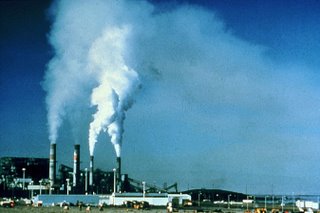 Global warming could shrink the world economy by 20% according a British study by the economist, Sir Nicholas Stern. The study is the first major review of the effects of global warming by an economist rather than a scientist. Its release coincides with another study on the impact of the effects of greenhouse gases. Prime Minister Tony Blair said the consequences for inaction would be disastrous.
Global warming could shrink the world economy by 20% according a British study by the economist, Sir Nicholas Stern. The study is the first major review of the effects of global warming by an economist rather than a scientist. Its release coincides with another study on the impact of the effects of greenhouse gases. Prime Minister Tony Blair said the consequences for inaction would be disastrous.Chancellor Gordon Brown commissioned the report. Brown is in line to replace Blair at Prime Minister next year and has promised the UK will take the lead in the international arena to tackle global warming. Mr. Brown has also recruited former US Vice-President Al Gore as an environment adviser.
This from the BBC:
A report by economist Sir Nicholas Stern suggests that global warming could shrink the global economy by 20%.
But taking action now would cost just 1% of global gross domestic product, the
700-page study says.
Tony Blair said the Stern Review showed that scientific evidence of global warming was "overwhelming" and its consequences "disastrous".
The review coincides with the release of new data by the United Nations showing
an upward trend in emission of greenhouse gases - a development for which Sir Nicholas said that rich countries must shoulder most of the responsibility.
****
The report says that without action, up to 200 million people could become refugees as their homes are hit by drought or flood.
"Whilst there is much more we need to understand - both in science and economics - we know enough now to be clear about the magnitude of the risks, the timescale for action and how to act effectively," Sir Nicholas said.
"That's why I'm optimistic - having done this review - that we have the time and knowledge to act. But only if we act internationally, strongly and urgently."
Mr Blair said the consequences for the planet of inaction were "literally disastrous".
"This disaster is not set to happen in some science fiction future many years ahead, but in our lifetime," he said.
"Investment now will pay us back many times in the future, not just environmentally but economically as well."
"For every £1 invested now we can save £5, or possibly more, by acting now.
"We can't wait the five years it took to negotiate Kyoto - we simply don't have the time. We accept we have to go further (than Kyoto)."
***
The Stern Review forecasts that 1% of global gross domestic product (GDP) must be spent on tackling climate change immediately.
It warns that if no action is taken:
population
extinct
refugees"
The study is the first major contribution to the global warming debate by an economist, rather than an environmental scientist.
Mr Brown, who commissioned the report, has also recruited former US Vice-President Al Gore as an environment adviser.
"In the 20th century our national economic ambitions were the twin objectives of achieving stable economic growth and full employment," Mr Brown said.
"Now in the 21st century our new objectives are clear, they are threefold: growth, full employment and environmental care."
He said the green challenge was also an opportunity "for new markets, for new jobs, new technologies, new exports where companies, universities and social enterprises in Britain can lead the world".
"And then there is the greatest opportunity of all, the prize of securing and safeguarding the planet for our generations to come."
Mr Brown called for a long-term framework of a worldwide carbon market that would lead to "a low-carbon global economy". Among his plans are:
Of course, this is an election year in the United States. How many Congressional or Senate races can you name where global warming is a top issue of concern? Just asking.
2 comments:
The ice atop Antarctica is some 18,000 feet thick, close to 4 miles. Obviously, it would take a long time to melt, but it desn't have to melt to cause a disasterous situation. The ice is becoming unstable. If it slides into the sea it would raise the sea level by about 270 to 330 feet. And it would happen quickly. The result would likely mark the end of civilization as we know it.
For all we know, you could be a sceptic. I am in year 9 and doing a masive project on global warming, and i know for a fact that melting of the ice would raise sea levles to great hight.
its not something that cant be fixed, cut down on all fosle fules and more, the world could be a better place!
Post a Comment